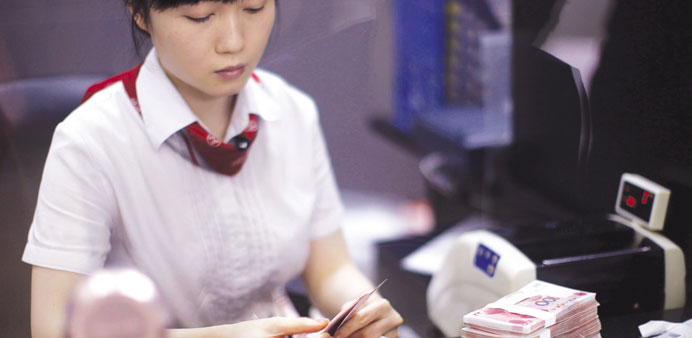An employee of the Industrial and Commercial Bank of China counts money at one of the bank’s branches at the Shanghai Free Trade Zone in Pudong district. Chinese authorities will cut interest rates, increase liquidity and tolerate some currency weakness to ensure the economy grows around 7% this year, as they try to head off deflation and keep employment strong enough to push on with reforms, policy insiders say.
Reuters/Beijing
Chinese authorities will cut interest rates, increase liquidity and tolerate some currency weakness to ensure the economy grows around 7% this year, as they try to head off deflation and keep employment strong enough to push on with reforms, policy insiders say.
Expansion of around 7%, expected to be unveiled as the official 2015 target when parliament meets next month, is seen as the minimum needed to stop unemployment from rising, a key political goal as the leadership gets people accustomed to a “new normal” of slower but more sustainable growth.
While top leaders have publicly eschewed major stimulus measures they think would cast doubt on their reform credentials, letting the economy, already growing at quarter-century lows, lose further momentum could fuel job losses and debt defaults among local governments and firms.
The government aims to put the economy on a more sustainable footing over time by encouraging capital away from state enterprises and into the more efficient private sector, reforming the fiscal system and liberalising interest rates, but such changes could slow growth in the short-term.
“Restructuring the economy and changing the development model will be very difficult if we don’t have stable economic growth,” said an influential economist who advises the government.
“We must guarantee the bottom line in growth. We should have policy to support if the economic performance worsens.”
Possible support includes more interest rate cuts to lower the cost of credit, and further reducing banks’ reserve requirements in order to add more funds to the financial system.
Interest rates were cut in November, and the reserve requirement ratio (RRR) was cut in early February. The economists, who are familiar with the policymaking process, expect another one or two rate cuts this year, while seeing up to 4 cuts in the RRR to help offset the squeeze on market funds from capital outflows.
The world’s second-largest economy grew 7.4% in 2014, its slowest rate of growth since 1990, and data so far this year has consistently pointed to slowing momentum. Exporters are struggling, the factory sector contracting, and the services sector, at the vanguard of economic transition, is losing momentum.
Policymakers are worried about deflation as consumer demand falters and falling factory prices erode the profitability of firms, undermining their ability to repay debt and invest.
“They have realised that downward pressures on the economy are rising and deflationary pressures are rising. So the need for loosening monetary policy to spur demand increases,” said a senior economist with a well-connected think-tank that advises policymakers.
“There is still room for further cut in RRR and interest rates,” said the economist, who spoke on condition of anonymity. There is also concern among policymakers that the yuan’s strength against currencies other than the US dollar is undermining competitiveness.
The yuan fell just over 2% against the dollar in 2014 as expectations grew that the US Federal Reserve would raise interest rates at some point this year.
But it rose about 6% on a trade-weighted basis, according to estimates by Standard Chartered Bank, including strengthening against the yen and euro.
Any slide in the yuan could worsen net capital outflows, which Swiss bank UBS estimates swelled to $160bn in the final quarter of 2014.
Traders think the central bank has been supporting the currency recently to counter the capital outflows, and merely stepping back would see the market push the yuan lower. Policy insiders say the central bank won’t go as far as deliberately pushing it down.
“It’s necessary for the yuan to weaken a bit, but we should limit the scope of depreciation to avoid hurting confidence in the economy,” said another government economist.

